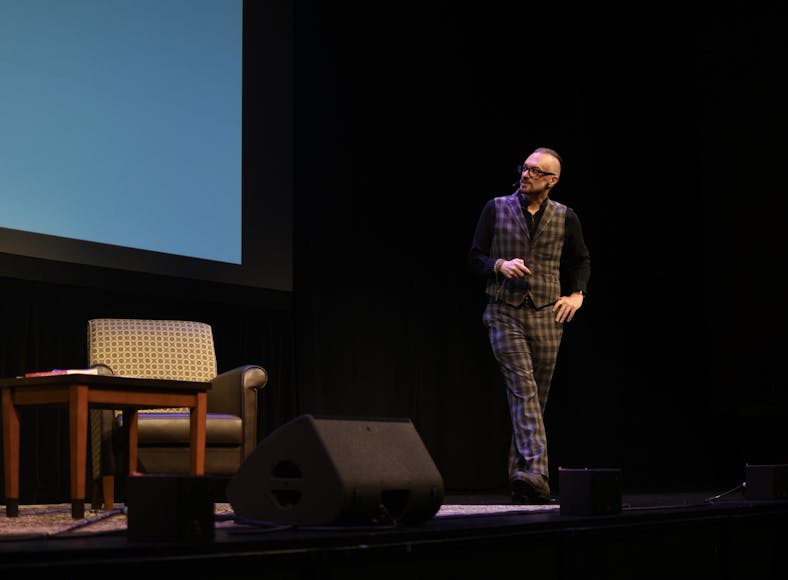Go Big Read 2023-24 author David McRaney delivered a presentation Tuesday alongside University of Wisconsin-Madison Chancellor Jennifer Mnookin, investigating topics of division and psychology from his book "How Minds Change."
The presentation was part of the UW-Madison’s annual Go Big Read event, founded by 2008-11 Chancellor Carolyn “Biddy” Martin with the intent of creating diverse academic conversation through a shared reading experience. Each year, a different book is selected and featured in campus events and select class activities.
“This is a subject and a book that is just so apropos for the current moment,” Mnookin said at the event. “Many of us are in search of better pathways to connect with people, to create meaningful and respectful spaces for dialogue.”
McRaney, a science journalist and podcaster, began by discussing a viral 2015 internet phenomenon: the alternately blue and black or white and gold dress that caused “mass division” on the internet. Despite the divide, McRaney said the difference in observed colors is entirely based on objective reality.
A viewer’s perception of the image is based on personal experience with natural and artificial light, McRaney said. Someone who has more exposure to natural light is going to see the dress as white and gold, but someone with more exposure to artificial light is going to see the dress as black and blue.
After just six weeks of exposure conditioning, people who saw white and gold can begin to see black and blue and vice versa. McRaney said this reinforces the idea that everyone can change their mind.
While conversing with Moonkin, McRaney said he previously believed "you can't reason someone out of a position that they didn't reason themselves into." However, while creating "How Minds Change," McRaney’s own beliefs changed.
“I don’t think anyone’s unreachable,” McRaney said. “I don’t think there’s anyone whose mind can’t be changed, no matter how strong they have gotten into their position.”
The “deep canvassing” psychological technique helped provoke this change, McRaney said. Canvassers would go door to door, talking and listening to people’s beliefs. Often, just listening to a person talk about their beliefs would cause them to talk themselves out of their position.
McRaney joined in on many deep canvassing sessions, finding value in discerning where motivations for belief come from and exploring the ensuing cognitive dissonance from interviewees.
Dissonance, he said, reinforces communal belief. According to McRaney, almost everything humans do is to maintain a reputation within their perceived community. These communities require members to have certain beliefs remain integrated within them, McRaney said.
That homogeneity leads to a greater fear of social death than physical death, according to McRaney. This prevents people from seeing the bigger picture. Exposing people to the world, McRaney said, is needed to solve this.
“These three pillars you need: intellectual humility, critical thinking skills, and you need media literacy,” McRaney said. “These need to be things you are engaged in, creating organizations around, teaching and spreading.”

David McRaney, the author of 'How Minds Change', speaks at the 2023 UW-Madison Go Big Read keynote event held at Shannon Hall in Memorial Union.






